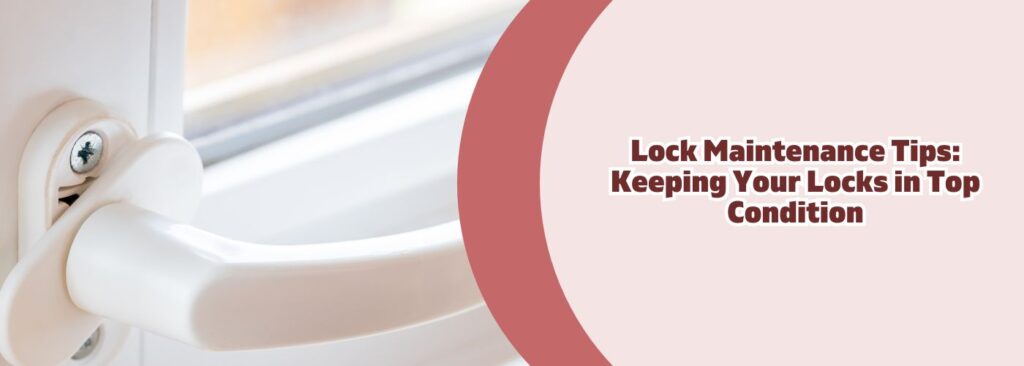Regular maintenance of your locks is crucial to ensuring the security and functionality of your home or business. Properly maintained locks are more reliable, last longer, and are less likely to fail when you least expect it. Here are essential tips for keeping your locks in top condition, ensuring they continue to operate smoothly and securely.

Clean Your Locks Regularly
Dust, dirt, and grime can accumulate in and around your lock mechanisms over time, leading to stiffness, jamming, or failure. To prevent this:
- Use a mild soap and water solution to clean the outer parts of the lock. Avoid harsh chemicals that can damage the lock’s finish.
- For the interior mechanisms, a dry, lint-free cloth is often sufficient to remove dust. In some cases, compressed air can be used to blow out debris from hard-to-reach places.
Lubricate Your Locks
Lubrication is vital for maintaining the smooth operation of your locks. However, it’s important to use the right type of lubricant:
- Use a graphite-based lubricant for internal lock mechanisms. Graphite lubricants don’t attract dirt and dust, which can clog the lock.
- Apply the lubricant sparingly. Excessive lubrication can attract more dirt or lead to build-up, causing the lock to become sluggish.
Check and Tighten Hardware
Over time, the screws and hardware that hold your lockset and strike plate in place can become loose due to regular use and vibrations:
- Periodically check the screws on your door hardware, including the lockset, hinges, and strike plate, and tighten them as necessary.
- Ensuring that all components are securely fastened helps maintain the alignment of your lock mechanism, reducing wear and tear.
Inspect and Replace Worn Parts
Locks contain several components that can wear out over time, especially in high-use areas:
- Regularly inspect your locks for signs of wear and tear, such as difficulty turning the key, a loose handle, or a deadbolt that doesn’t align properly.
- Replace worn or damaged parts promptly to prevent lockouts or security breaches. This might include changing springs, pins, or the entire lock if necessary.

Duplicate Keys from Originals
Keys can wear down over time, leading to difficulties in operating the lock:
- Always duplicate keys from the original key, if possible, to ensure the best fit. Duplicating a copy of a copy can introduce errors, making the key less precise over time.
- If your key is bent or damaged, replace it immediately to avoid damaging the lock.
Schedule Professional Inspections
While regular DIY maintenance can significantly extend the life of your locks, professional inspections can catch issues you might miss:
- Have a professional locksmith inspect your locks every few years, especially for complex systems like master key systems or electronic locks.
- A professional can also provide insights into potential security upgrades or newer lock technologies that could benefit your home or business.
Regular maintenance is key to ensuring the longevity and reliability of your locks. By cleaning, lubricating, tightening hardware, inspecting for wear, and seeking professional advice when necessary, you can keep your locks functioning smoothly and securely for years to come. Remember, well-Maintained Locks are your first line of defense in home or business security.
